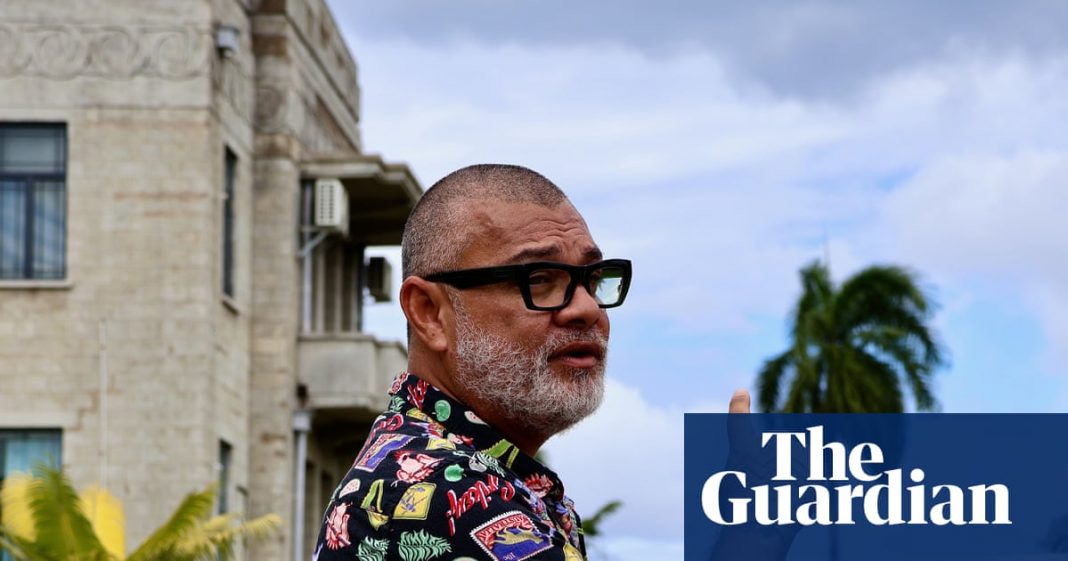“My tours are overtly critical. This isn’t a gorgeous city – it’s a broken-down city, but it’s the city of my birth,” says Peter Sipeli, a Fijian poet, gay rights activist and our tour guide. “But you’re frustrated and have problems with the things you love the most,” he adds.
I’m on a walking tour of Suva, Fiji’s thronging, fractured capital. This tour isn’t for travellers looking for the cheery, “Bula!”-fied version of Fiji, nor is it about discovering the city’s hidden gems or hole-in-the-wall cafes. Really, it’s an anti-tour: unravelling Fiji’s complicated, postcolonial past and present; its racial tensions and religious dogma.
The city has not always welcomed Sipeli, who came out as a 17-year-old in the early 1990s. Ostracised by his family, he briefly moved to New Zealand, before returning to Suva to lobby for LGBTQ+ rights and set up The Poetry Shop, a collective for emerging writers.
Most travellers skip Suva for Fiji’s palm-fringed islands, to snorkel in confetti reefs or cocoon in honeymoon hotels. Sipeli’s two-hour walking tours are open to anyone, but in truth, the two other people on this tour with me are in Suva for work – one at an NGO tackling Fiji’s soaring HIV epidemic and the other as part of a university degree in climate science.
“Suva is the cultural hotspot of the country. If you’re interested in how the country works, this is where you’d come,” says Sipeli.
The four of us follow the colours and chaos to Suva Municipal market, where vendors sprawl under tarp canopies, selling bunches of bananas, glossy eggplants, fraying cabbages and huge vats of phosphorescent orange juice. Don’t be fooled, Sipeli warns, it’s mostly Tang with a few cumquats thrown in.
The reason the market is so diverse is because of the different communities living in Suva, he says. Fiji has two main ethnic groups: iTaukei or Indigenous Fijians (58%), and Indo-Fijians (38%). “Now we also have Chinese vendors, Korean vendors and Filipino vendors,” Sipeli says. We hover at a bus stop where faded canary-yellow buses sigh, waiting to be filled. “Calling Fiji ‘multicultural’ gives the impression that everyone’s happy,” says Sipeli. But there are fractures under the surface. “We can be a racist country – we only deal with the tensions.”
The commotion in the heart of the city is a change of pace from the sun-drunk island paradise advertised on travel brochures. “When you’re in Suva you get the contrast from the beach, to dirty streets and crazy cars,” Sipeli says.
We joke about the “White Lotus effect” – that in almost any upmarket Fijian resort you will find a friendly man strumming a guitar, shouting bula (hello) with a big booming voice and a broad smile. “Nobody used to do that. You say it once and that’s it. There’s a fakery there, but the [tourism] industry presents these illusions that feed what Fiji is,” he says.
Sipeli says his poetry focuses on the wounds of his country “rather than the light”, but every so often, the sun cracks through.
We hover outside a stately cathedral, built in 1926, with pale sandstone imported from Sydney’s deep quarries. Organ music floods the street and women dress the pews in their brightest florals – today is Sunday after all.
One older woman, her dress a ripple of rainbow, leaves the mass and says something indecipherable in soft Fijian. “May you be blessed in the company of Fiji, and I pray that you’ll have a really good day,” Sipeli translates. She turns to him: “And may you be blessed in your guardianship of these people,” he repeats.
No landmarks, or cultural taboos, are out of bounds for Sipeli, who waves at Suva’s public bathrooms and gestures casually to the police station, where he was once arrested for a protest against China, Tibet and the Beijing Olympics.
The tour is filled with tiny tangents like this. We check to see if “the grumpy sisters” are serving curry from their stand in a sports stadium (they are known for their light, pillowy rotis and dark glowers). “The meaner they are the better the food,” says Sipeli. We poke our head into a palatial Chinese restaurant, festooned in crimson and gold and home to the most fantastic drag shows, Sipeli says.
Along with three other trained guides, Sipeli also runs art gallery tours, women’s tours, bird watching tours and dive bar tours – the latter hosted by a drag queen and trailed by a security detail. Sipeli’s tours began in 2022 and run every day of the week.
Although Sipeli writes in English, he tells us Fijian is incredibly poetic. “When I’m stuck for poetic devices, I do the sentence in Fijian and then translate it back into English.”
Take na batini waitui, or the teeth of the ocean, which describes the line where waves crest and swallow the land. He shares this, and for a moment our group is silent, appreciating the beauty of a dialect we’ll likely never understand. “And there’s a man peeing up against the wall,” Sipeli says, moving us along to the next attraction.


